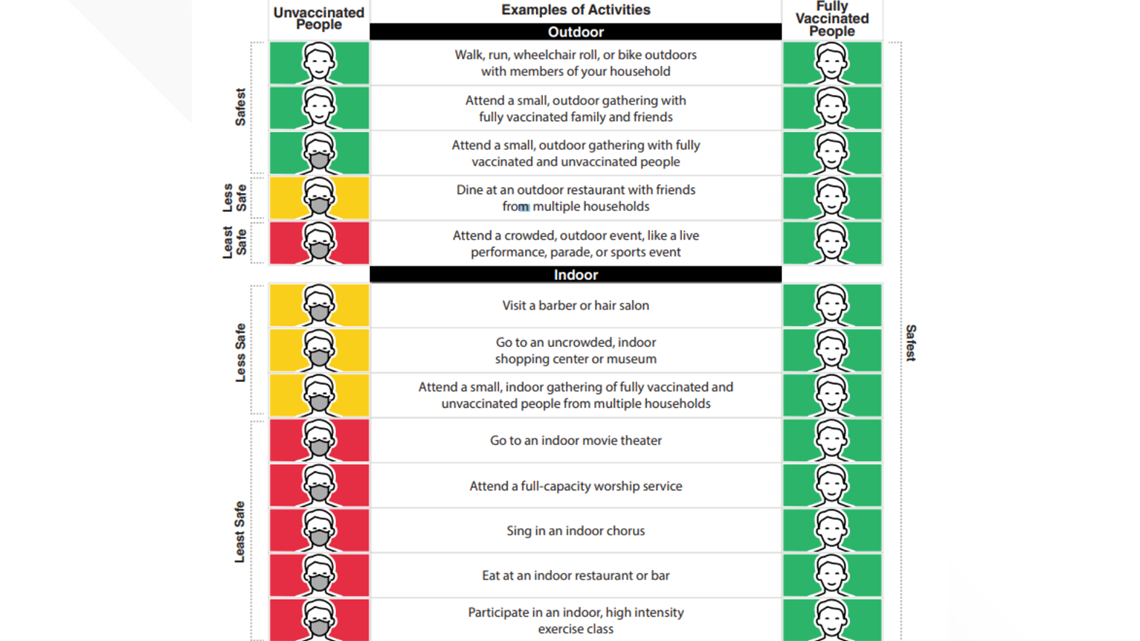The Centers for Disease Control and Prevention (CDC) updated its face-mask guidance on May 13 to say people who are fully vaccinated against COVID-19 don’t need to wear a mask in most settings unless there’s a federal, state or local requirement. The guidance still advised people who are not vaccinated to wear a mask in most settings.
Following the updated guidance, businesses were left to decide if they would still require masks, and if they did, how they would enforce their policies. It also left many people wondering what businesses can do in terms of asking customers about their vaccination status.
The VERIFY team answered several questions about the new guidance.
THE QUESTION
Is it safe to not wear a mask?
THE SOURCES
- CDC
- Dr. Anthony Fauci, director of the National Institute of Allergy and Infectious Diseases.
THE ANSWER
It is safe for people who are fully vaccinated against COVID-19 to not wear a mask in most settings, according to the CDC, but people who are not vaccinated are advised to still wear a mask and physically distance in most situations.
WHAT WE FOUND
It’s far less likely that a person who has been vaccinated will get infected or spread COVID-19, as compared to a person who has not been vaccinated. The CDC says people are considered fully vaccinated against COVID-19 if it’s been at least two weeks since they received the second dose of the Pfizer or Moderna vaccines or two weeks after receiving the Johnson & Johnson vaccine.
Dr. Anthony Fauci, the director of the National Institute of Allergy and Infectious Diseases, said in a White House briefing announcing the new face mask guidance on May 13 that “the risk is extremely low of getting infected if you’re vaccinated whether you’re indoors or outdoors.”
About half of the total American population has received at least one dose of a COVID-19 vaccine and about 39% of the total population is considered fully vaccinated as of May 25, according to the CDC.
The updated mask guidance from the CDC included an infographic showing when it’s safe for people to wear masks based on their vaccination status. While people who are fully vaccinated don’t need to wear a mask in all the listed situations, the CDC still recommends people who are unvaccinated should wear a mask in most settings.


Everyone, regardless of their vaccination status, is required to still wear masks in places where federal, state and local mandates are in place.
People who are vaccinated but immunocompromised should discuss whether they should continue wearing a mask with their health care provider, the CDC says.
THE QUESTION
Have most major retailers dropped their mask requirements?
THE SOURCES
THE ANSWER
Yes, many national retailers have changed their mask requirements. Stores are still subject state and local mask mandates, though.
WHAT WE FOUND
Whether a customer must wear a mask is based on each retailer’s policy, and whether there are state or local mask requirements still in place.
Many national retailers have updated their mask policies in the days after the CDC announced the new mask guidance on May 13.
Costco, Kroger, Target, Walgreens and Walmart no longer require customers who are fully vaccinated to wear masks, except where state or local mask mandates are in place. Each company asks but does not require customers who are unvaccinated to continue wearing masks, in accordance with the CDC guidance.
While the retailers have updated their policies, they are still subject to mask requirements that remain in place at the state or local level. Those mandates vary.
THE QUESTION
Can a business require a customer who is unvaccinated to wear a mask even if there is no federal, state or local mandate to wear a mask in that setting?
THE SOURCES
- Carrie Hoffman, partner at Foley and Lardner LLP.
- Margaret Foster Riley, professor of law at University of Virginia School of Law.
- Glenn Cohen, professor at Harvard Law School.
THE ANSWER
Yes, a business can require a customer who is unvaccinated to wear a mask, even if there is not a mandate.
WHAT WE FOUND
Businesses can still require all customers, both unvaccinated and vaccinated, to wear masks.
Carrie Hoffman, a partner at Foley & Lardner LLP who specializes in labor and employment law, said a business can require a mask regardless of if there’s a mandate. She said there are a couple of approaches businesses can take when it comes to requiring customers who are not vaccinated to wear masks.
“Realistically, they will need to either (1) have some way to verify that customers are vaccinated or (2) require all customers to wear masks,” Hoffman told VERIFY via email.
Hoffman and Margaret Foster Riley, a health law expert at the University of Virginia School of Law, said a rule requiring customers who aren’t vaccinated to wear masks may be difficult to enforce. They said businesses can also choose to go by the honor system and trust people are following the guidance that corresponds with their vaccination status or just require all customers to wear masks.
Glenn Cohen, a professor at Harvard Law School, said state laws, which vary, can also play a role in whether a private entity can ask about vaccination status. Hoffman said in addition to state laws, businesses need to consider the Americans with Disabilities Act (ADA) when enforcing mask rules.
THE QUESTION
Is a business asking a customer about their vaccination status a violation of HIPAA?
THE SOURCES
- U.S. Department of Health and Human Services (HHS)
- CDC
- Glenn Cohen, professor at Harvard Law School.
- Kayte Spector-Bagdady, lawyer, bioethicist and associate director at University of Michigan’s Center for Bioethics and Social Sciences in Medicine.
THE ANSWER
No, most businesses would not violate HIPAA by asking about a customer’s vaccination status.
WHAT WE FOUND
The CDC says HIPAA is a federal law “that required the creation of national standards to protect sensitive patient health information from being disclosed without the patient’s consent or knowledge.”
The law applies to what are called “covered entities.” According to the U.S. Department of Health and Human Services (HHS), there are three different categories of covered entities: health care providers, health plans and health care clearinghouses. HIPAA also applies to business associates of covered entities.
HHS says protected health information under HIPAA includes information that relates to a person’s past, present or future physical or mental health or condition.
While HIPAA rules apply to covered entities and specific business associates, the rules don’t extend to most businesses, according to Glenn Cohen.
Kayte Spector-Bagdady, a lawyer and bioethicist who is also the associate director at the University of Michigan’s Center for Bioethics and Social Sciences in Medicine, said there is sometimes a misunderstanding of what HIPAA does.
“People often feel like HIPAA protects them from being asked about their medical information, or prohibits other people from asking about their medical information,” Spector-Bagdady said. “Neither is true. HIPAA prohibits health professionals, such as your doctor, from sharing your identified health information without your permission in most circumstances. People can always ask about your health information, and you can almost always decline to answer. But not answering health questions might come at a cost – such as not being able to enter your workplace or board a plane.”
More from VERIFY: Yes, vaccinated parents of unvaccinated children can go to public settings without a mask
VERIFY
Our journalists work to separate fact from fiction so that you can understand what is true and false online. Please consider subscribing to our daily newsletter, text alerts and our YouTube channel. You can also follow us on Snapchat, Twitter, Instagram or Facebook.



